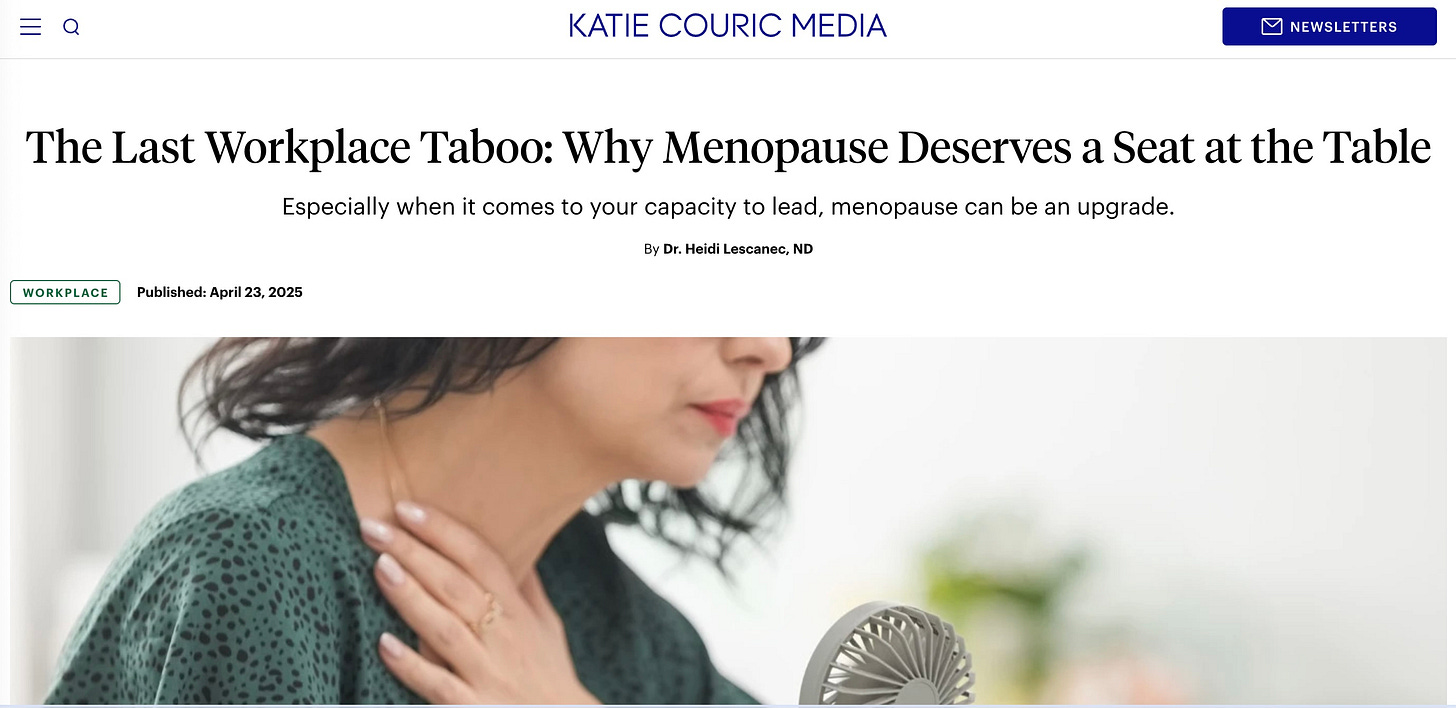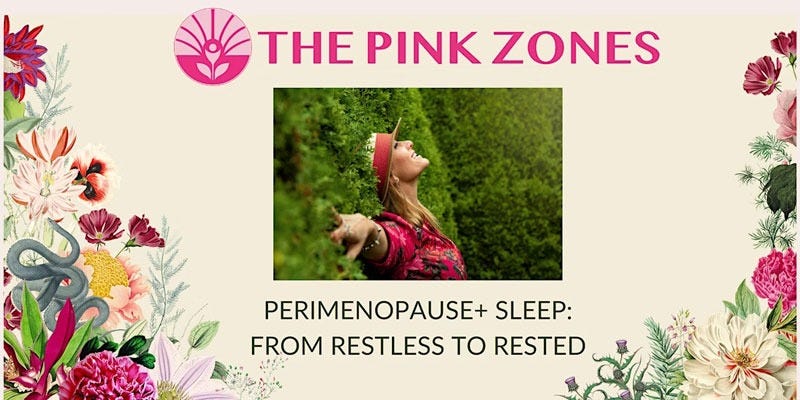The Last Workplace Taboo
Why Menopause Deserves a Seat at the Table
You’re in a meeting, mid-sentence, when your face suddenly flushes. Your heart starts to race. You fumble for your words, hoping no one notices. You’re not anxious. You’re not unprepared. You’re just having a hot flash.
Menopause in the workplace: It’s a topic we rarely address, yet it affects so many of us. This transition is a natural phase of life for half the population, but too often, women feel isolated, misunderstood, and ashamed. A hot flash in a strategy session. An unpredictable period before a big pitch. (“The ultimate scheduling betrayal” is what a member of my podcast club called it.) A myriad of symptoms, as unique as you are, met with silence or stigma.
And that shame? It doesn’t come from your body itself, it comes from the meaning society attaches to it. It’s the antiquated notion that menopause makes you less capable, less relevant, or somehow “past your prime.”
But that narrative? It’s not just outdated—it’s harmful. Dr. Gabor Maté, a physician known for his work on trauma and the mind-body connection, reminds us:
“Trauma isn’t what happens to you—
it’s what happens inside you as a result of what happens to you.”
When the world pretends menopause doesn’t exist, or frames it as decline, you’re left to process it alone. Without understanding, shame fills the void. And shame doesn’t just sit quietly—it activates your stress response. It triggers cortisol spikes, disrupts your immune system, and puts your nervous system on high alert. It becomes a vicious cycle: the more shame you carry, the more stress you feel. The more stress you feel, the harder it becomes to think clearly, sleep deeply, or show up fully. Over time, this erodes not just your health, but your ability to work with ease and confidence.
So now you have to ask yourself: Is menopause as a biological transition the problem, or is it this stress cycle that gets triggered in this inflection point? The distinction matters. Because when you take away the shame, the silence, and the systemic neglect, what’s left is often manageable, and even transformational.
Here’s the truth: menopause itself isn’t a decline. In many ways, especially when it comes to your capacity to lead, to make decisions, and see things clearly, menopause can be an upgrade.
The Blind Spot in the Boardroom
Despite the millions of women navigating menopause, most workplaces haven’t caught up. Menopause rarely shows up in wellness programs and HR policies, so you’re left managing symptoms in secret, worried about being judged, sidelined, or dismissed.
You might power through the day after yet another sleepless night. You might second-guess your memory or feel emotionally raw in ways you didn’t before. And still, you show up, deliver, and lead. But at what cost? You shouldn’t have to choose between your health and your career. You shouldn’t have to pretend nothing’s happening. And you shouldn’t have to educate your manager about something half the world will go through.
We’ve made space in the workplace for parenting, mental health, and fertility support. Isn’t it time we did the same for menopause? By 2030, around 1 billion people worldwide are projected to be in menopause, with 47 million new people entering this phase each year. Currently, one-in-five people in the workforce is navigating perimenopause or menopause, and 20 percent of them are experiencing symptoms severe enough to interfere with work and life.
This same midlife demographic is the backbone of essential career sectors — bringing hard-earned wisdom, deep competence, and a level of experience that holds entire systems together.
The Disruption — and What Comes Next
Let’s be honest: Perimenopause can be disruptive. Especially when it arrives unannounced in your forties — right when you’re already carrying the weight of a career, caregiving, aging parents, and a never-ending mental load. For many of us, the demands of our thirties and forties push true self-care — healthy boundaries, nutrition, movement, and rest — off the agenda. Sleep has likely been stretched thin for decades. Your needs may have been quietly deprioritized in service of everything and everyone else.
By the time perimenopause hits, your reserves are already low. Your body is asking for attention you’ve trained yourself to ignore. The transition can feel like it’s unravelling you, particularly if you don’t have the foundational support — medical, social, or professional — that you need.
But even as it feels like things are coming apart, your brain is undergoing something far more interesting. Dr. Lisa Mosconi, a renowned neuroscientist who has extensively studied the female brain, writes in The Menopause Brain: “Many lines of evidence indicate that women’s brains have the remarkable, much underestimated, yet-to-be-celebrated ability to adapt to menopause.”The Study of Women’s Health Across the Nation, better known as the SWAN study, followed 2,362 participants over four years and showed that while women may feel foggy or forgetful during perimenopause, those changes are part of a neurological rewiring — not a deterioration. Brain scans do reveal temporary dips in gray matter and energy use during the transition, but these recover post-menopause. What’s more, research shows that women in midlife don’t perform any worse on cognitive tasks than men their age — not even when they’re in the thick of hormonal changes.
Yes, you may feel less sharp — compared to your baseline — but the data tells a different story. A 2021 study published in Scientific Reports led by Lisa Mosconi used advanced neuroimaging to track structural and metabolic changes in the brain across the stages of menopause. While it confirmed significant shifts in energy and connectivity, it also found that these changes do not result in diminished cognitive abilities — especially when compared to age-matched men.
There’s another chapter we don’t discuss often enough: Neuroscientists and physicians are beginning to paint a new picture of the postmenopausal brain — one that’s clearer, more focused, and more emotionally attuned. Louann Brizendine, calls this phase “The Upgrade,” which is the title of her book — and it’s not a euphemism. It’s a real, measurable shift in how you think, lead, and operate.
You’re less burdened by the hormonal rollercoaster. You’re less likely to ruminate. You’ve developed the kind of intuitive thinking that lets you see around corners. This isn’t about surviving menopause — it’s about emerging stronger, wiser, and more equipped than ever to show and contribute.
These are the qualities we need in our organizations. These are the superpowers that deserve a seat at the table. And yet, menopause still lingers on the margins of HR strategies, despite its widespread impact on performance, retention, and workplace equity. One study found that menopause-related symptoms cost U.S. employers $1.8 billion annually in lost productivity, absenteeism, and turnover. And much of that is preventable.
Changing the Conversation
Thankfully, the silence is starting to break. A handful of companies are introducing menopause policies, manager training, and flexible work options. Conversations about menopause leave and workplace accommodations are gaining traction. And around the world, women are pushing back against the narrative of decline.
But we can’t wait for top-down change. It starts with conversations, with rejecting the tired narrative that menopause marks decline. With building cultures where women are valued not despite “the change” — but because of it. With building workspaces where women can bring their whole selves to work — imagine a workplace where menopause is discussed as openly as maternity leave, where HR has a playbook, and managers aren’t caught off guard. One where you don’t have to hide, explain, or overcompensate — because you’re already supported, understood, and respected.
That’s not a fantasy. It’s a future we can build, if we start now. So ask yourself: Do your colleagues or managers understand menopause? Do you have the structures you need to work through it with confidence? Can you show up as yourself — fully — without having to filter or apologize?
If the answer is no, then it’s time to start the conversation. Not just for you, but for every woman coming up behind you. Let’s stop treating menopause as a private burden and start calling it what it is: a powerful, natural, and often transformational phase of life. Let’s rewrite the narrative. Let’s claim the seat at the table. Because when women thrive, everyone benefits.
What’s one thing you wish workplaces understood about menopause?
I’d love to hear your thoughts or experiences in the comments.
P.S. If sleep has been one of the challenges for you during perimenopause or menopause, I’m hosting a free online webinar on May 24 10-11am PST all about sleep, hormones, and practical strategies to get your rest back.
I'll be joined by Sukhpreet Patel, MD (ObGyn, India) | MPH | HCA-Registered Health & Nutrition Counselor™ (Canada), founder of Menopause Wize.
In this free webinar, we’ll explore:
Why so many women struggle with sleep during perimenopause and menopause.
-The hormonal changes and other physiological shifts that disrupt your night. -Why waking at 2-4 a.m. is so common.
How getting back your deep restorative sleep both reduces symptoms and provides the vital support for all other systems (metabolic, brain, heart) during this transition and beyond.
Natural strategies and practical tools to improve sleep.
30 minutes for Q+ A
Whether you’re perimenopausal or menopausal, or simply wondering why your sleep has shifted, this morning will offer real talk and real tools to help you reclaim your rest.
You can find all the details and sign up below— I’d love to have you join us!





Your post, Heidi, made me recall a workplace menopause moment. I kept a small fan on my desk for when the random hot flash would hit. One winter day I was meeting with a young male employee, who was seated on the opposite side of my desk. As the heat started rising up from my chest, I casually (so I thought) reached over and turned on the fan. With a quizzical look on his face, the young man and asked, "Are you hot?" I simply said yes, then returned to our conversation. I had no other words at my disposal. In boardrooms, I'd hold a cold bottle of water against my wrist hoping that would tame the heat. It rarely did. Yes, yes, we need education and conversation about this natural phase of life, which is not indicative of a "decline."
I wholeheartedly agree with you, Heidi, the conversation needs to change. More to the point of my experience, we need to start having these conversations. They are sorely needed. I remember reading an interview with Gale Sheehy during which she mentioned that her book on menopause, "The Silent Passage," was reported to be the most stollen from bookstores at that time it was published. Women wanted to read it but were embarrassed to be seen buying it. I have to think times have changed, but the lack of understanding persists.